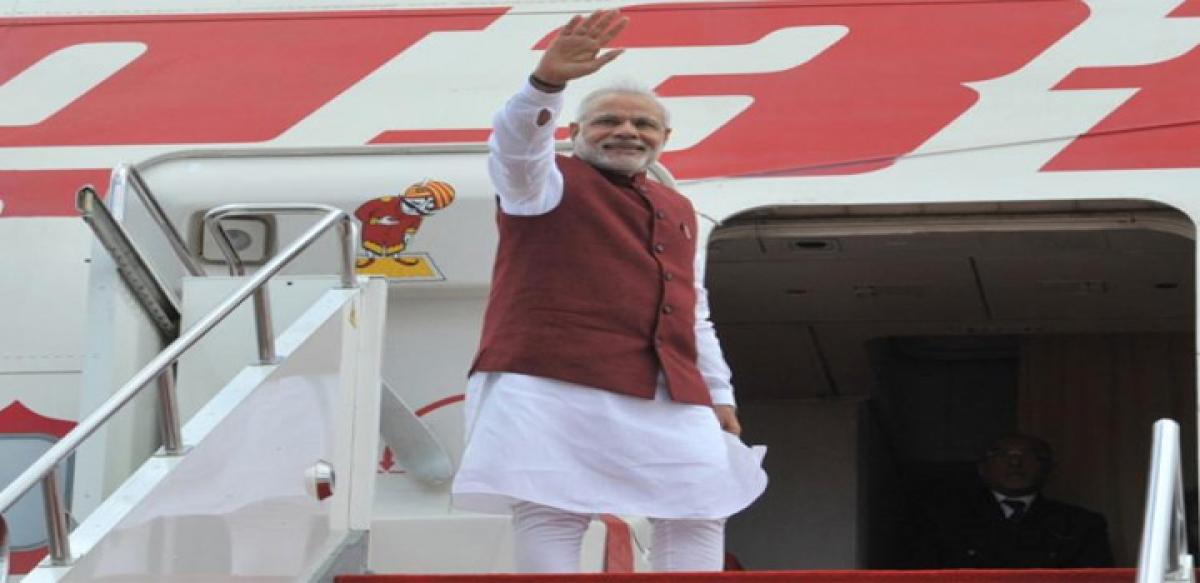Live
- South Korean health officials call for vaccine over spike in whooping cough cases
- Priyanka talks about her docu ‘Womb’: Rallying call to action for women
- Court extends Manish Sisodia's judicial custody till May 8 in ED case
- Captivating performance by disciples of Guru Ananda Shankar Jayant
- 91 pc of Indian firms will use half or more data to train AI models
- Innovative cyber security program for engineering graduates
- Indian-origin researcher unravels link between depression and heart disease
- The importance of technology education schools
- New Delhi: Will severe heat wave affect polling tomorrow?
- Delhi Zoo to roll out membership plans
Just In

Come Wednesday, a crucial three-nation tour begins for Prime Minister Narendra Modi. In Belgium, he is set to be confronted with key trade and bilateral issues between the EU and India. The thorny issues of Compulsory Licence and protection of geographical indications (GI) are likely to figure in deliberations at Brussels.
Come Wednesday, a crucial three-nation tour begins for Prime Minister Narendra Modi. In Belgium, he is set to be confronted with key trade and bilateral issues between the EU and India. The thorny issues of Compulsory Licence and protection of geographical indications (GI) are likely to figure in deliberations at Brussels.
Later, Modi will be at the fourth nuclear security summit in Washington on Thursday and Friday. On his way back, he will halt in Riyadh for a two-day visit. PM will face pressure to cede more concessions for global players either on security considerations or for further foray into India’s vast domestic market.
At the US summit, India needs to forcibly draw attention to preventing nuclear technology from passing into the hands of non-State actors like ISIS. At Brussels EU summit, however, Modi will have to harness all the diplomatic prowess he gained during his globe-trotting. EU has set some vociferous demands for India to meet before signing the Free Trade Agreement. It even looked the other way, when Modi was in Brussels last year and sought a meeting.
Both the US and the EU have been exerting pressure on India for strongest intellectual property (IP) protection policies as existent in their countries, in return for easy access to their market and technology transfers. They are particularly sore over Compulsory Licence. Recently, the US India Business Council asserted that the Modi government had privately assured it about not resorting to its use in the future. The Modi government’s mere denial of the same doesn’t instill confidence.
He has to follow it through with a strong assertion of India’s stated policy. Under the Agreement on Trade-Related Aspects of Intellectual Property Rights (TRIPS), India can license domestic firms to produce generic versions of drugs discovered and patented abroad, to meet public health emergencies and other contingencies as envisaged in the Doha deal. Though, India has been responsible and issued only one licence in 2012 for generic version of Nexavar, an anti-cancer drug of Bayer, both the US and the EU want it to forego this sovereign right altogether.
Under the Indian Patent Act, 1970, India can issue a compulsory licence if the patent holder is not giving technology at reasonable rates or if it is not manufacturing in India. Besides, by facilitating a robust generics industry, India has come to be the ‘pharmacy of the developing world’ for poor nations.
Organisations like Médecins Sans Frontières (MSF) which rely heavily on cheaper Indian generics for their charity work, also pray that India does not compromise on its interests, in its eagerness for FTAs which have so far meant only greater imports and negligible exports. As for GIs, European companies, especially,
insist on exclusive protection for their famed products. Besides, the US and the EU agri and dairy sectors which are in a slump want elimination of tariff protection for these sectors in India. With a tech edge and more funds, they will flood India, while Indian products may not come any cheaper abroad. Thus, it should not be a free for all with a free trade pact.

© 2024 Hyderabad Media House Limited/The Hans India. All rights reserved. Powered by hocalwire.com







